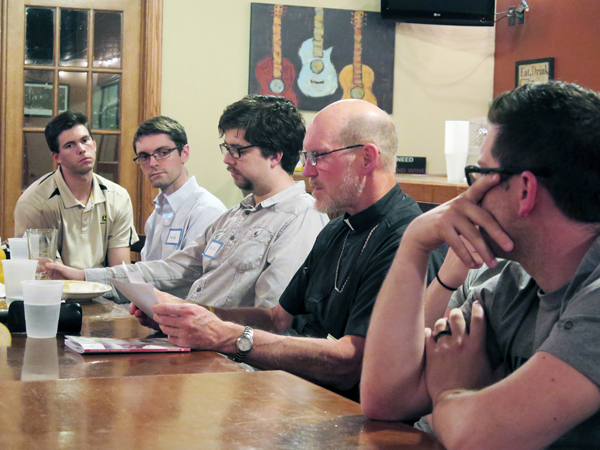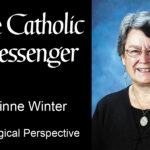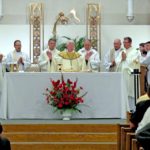By Anne Marie Amacher
The Catholic Messenger
DAVENPORT — Bishop Thomas Zinkula put prayer on tap during a July 12 gathering of young adults for Theology on Tap at Jersey Grille. “Of course, let’s begin with prayer,” the bishop said, choosing one from St. Augustine, an early Christian theologian.

Bishop Thomas Zinkula talks about prayer July 12 during Theology on Tap in Davenport.
To begin his talk on prayer, he asked “Where do you begin? Where do you end?” He encouraged the young adults to read Pope Francis’ new apostolic exhortation “Gaudete et Exsultate” (Rejoice and Be Glad).
“We are called to holiness no matter our state in life,” the bishop said. “Prayer helps us to grow in holiness.” But the endless array of gadgets and consumer goods can crowd out room for God’s voice to be heard. As the Holy Father said, “We are overwhelmed by words, by superficial pleasures and by an increasing din filled not by joy but rather by the discontent of those whose lives have lost meaning.”
The bishop said he views prayer as “hanging out with God.” We hang out with family and friends in order to get to know each other better. God “wants us to hang out with him as well in order to get to know him better.”
We should make time everyday to pray to God. We schedule all kinds of appointments, so why not schedule time for prayer? We can read Scripture, or do lectio divina (Scriptural reading, meditation and prayer). We can pray the rosary. Prayer can be contemplative or prayerful reflection, such as the daily Examen. Intercessory prayer is another form of prayer.
“Start off by thanking God,” Bishop Zinkula advised. Then tell him what you need from him. Finally, listen to God. Give him a chance to get in a word edgewise. Let him speak to your heart. His answers aren’t always clear, but can be subtle and revealed over time.
God speaks to us at work and through others, the bishop noted. We need to open our eyes to see what God wants us to do and our ears to hear who God wants us to be. “If we take time to see and listen, we become truly open to what God is calling us to do and be.” And that might be something we hadn’t thought about.
Bishop Zinkula described the Examen as “a simple form of prayer directed toward developing a special sensitivity to the specific ways God approaches us, invites us and calls us.” The Examen is typically done at day’s end.
Prayer helps us to discern our own path, bringing out the best in ourselves, the most personal gifts that God has placed in our hearts.
The principles of discernment, the bishop said, require a lot of time praying about an issue. We need to reflect on whether the tentative decision is in the interest of God and others as well as ourselves. The primary tools in discernment are reason and prudent judgment, so we need to gather the information we need to make an informed decision. He encouraged the participants to talk about the issue with someone they trust and respect. God’s truth sometimes calls us to go beyond what is comfortable and conventional. Be willing to take risks and make mistakes. Give the tentative decision some time to settle, if possible. Consider the degree to which the tentative decision brings inner peace and deep satisfaction. Play the devil’s advocate and try to find one or more conclusive arguments against the tentative decision. And finally, if all of these things have been done and there is still doubt — flip a coin!
The bishop concluded his talk on prayer with the story of his discernment of a call to the priesthood, and took questions afterwards. Someone asked whether God answers people in dreams. Bishop Zinkula said dreams play a special role in our lives, as they did in the lives of biblical figures. He said that a year or two after the death of his maternal grandfather, he had a dream about him. “I had a dream in which he was wearing clerics. My interpretation was that he was in heaven. A few years later, while I was in the seminary, I wondered if an additional interpretation might be that he was saying that I had a vocation to the priesthood.”
Another attendee asked the bishop how he promotes and finds quiet time? “It’s tough,” Bishop Zinkula admitted. “We have to be intentional. We need to make time.”











